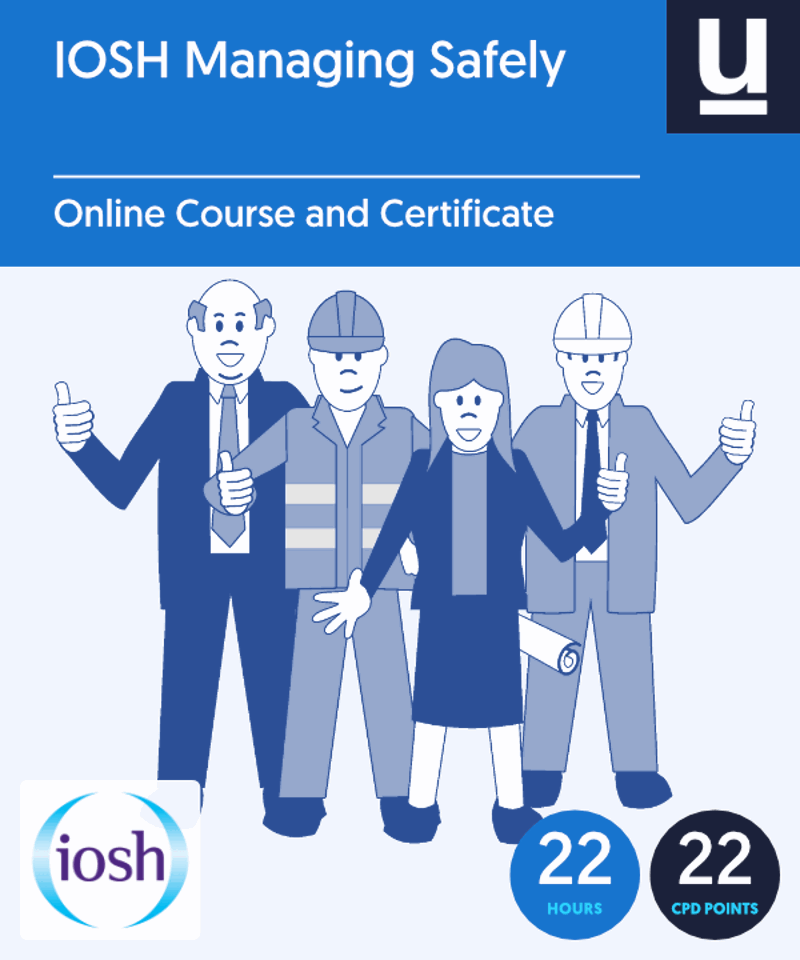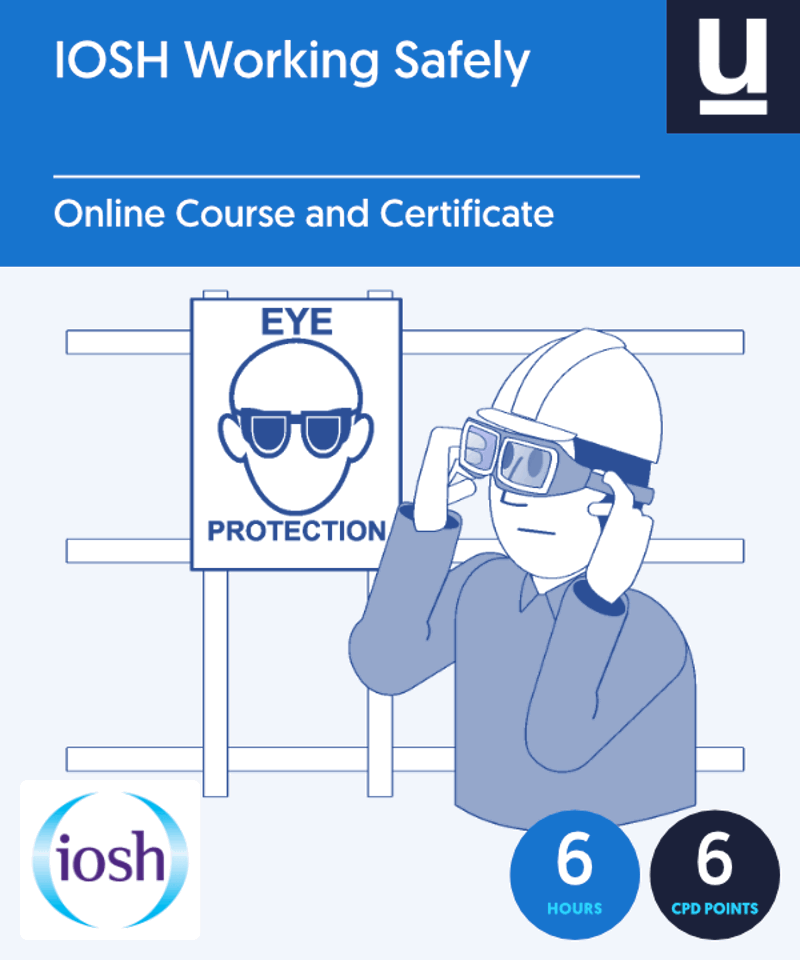What does IOSH stand for? | What is IOSH?
IOSH is the Institute of Occupational Safety and Health. It is the Chartered body for health and safety professionals, providing qualifications to raise the standards of health and safety in the workplace worldwide.
IOSH certificates are internationally recognised as some of the best health and safety qualifications and we are inclined to agree.
How long does it take to get an IOSH certificate?
Commodious' Working Safely training takes approximately 6 hours to complete while Managing Safely is a health and safety management course and takes approximately 22 hours in full.
Once the assessment has been passed, IOSH will process the results within 5 working days (often less). The certificate is then mailed to Commodious to be forwarded to you.
When we receive the certificate, we email a PDF scan of the certificate to you before posting the physical copy. The paper certificate usually arrives within 5 working days of passing the assessment.
How long does an IOSH qualification last?
An IOSH qualification never expires, however, the Institute of Occupational Safety and Health recommends taking a refresher course every three years. This is standard practice for most health and safety qualifications and helps to keep your knowledge up to date with current best practices and legislative changes.
What about the courses?
Now that we've covered the questions that apply to both qualifications, let's take a closer look at the courses themselves.
What is IOSH Working Safely?
IOSH Working Safely is an entry-level health and safety course aimed at workers who need to understand the basics of occupational health and safety. The online course covers all of the essentials that anyone in any role should know in order to help protect themselves and their colleagues.
There are no entry requirements as the course is pitched for anyone to learn health and safety essentials with no prior experience. Passing the course does not grant IOSH membership, however, it is a great first step towards membership. You can find out more about membership here.
IOSH Working Safely Course Content
The course is split into five interactive modules:
- Module 1 - Introducing working safely
The principles of why working safely is important. The first module covers the following: - Why it is important to work safely.
- Who is responsible for safety and health in the workplace.
- An organisation's responsibilities for safety and health.
- Who has responsibility for worker actions.
- Module 2 - Defining hazard and risk
The second module defines key aspects of working safely: - The six hazard groups (mechanical, physical, chemical, environmental, biological, organisational).
- Hazards that are not easy to identify.
- What is meant by the terms 'hazard' and 'risk'.
- What is meant by the term 'risk assessment'.
- What is meant by the terms 'likelihood' and 'consequence'.
- Deciding on what actions to take to control risk.
- What is meant by the term 'reasonably practicable'.
- Module 3 - Identifying common hazards
The third module covers an overview of common hazards, including how they can cause harm and what can be done about them. The common hazards covered range from aggression and violence, asbestos, chemicals and harmful substances, to computer workstations, electricity, and welfare facilities.
- Module 4 - Improving safety performance
Module 4 covers what organisations can do to improve safety in the workplace including: - What a safe system of work is.
- What a 'permit to work' is.
- Types of workplace inspections.
- Emergency procedures.
- Reporting incidents.
What is IOSH Managing Safely?
The IOSH Managing Safely course is the market-leading health and safety course for managers and supervisors and is suitable for anyone responsible for managing others in the workplace, regardless of sector. The information and techniques the course covers help to more effectively manage a workforce, implement key safety measures and maintain the health and wellbeing of employees.
What level is IOSH Managing Safely?
Managing Safely is a level 2 qualification. The course explores the fundamental concepts of health and safety in more detail than the Working Safely training as well as concepts for management of workforces such as developing a safety culture.
While the course is aimed at managers and supervisors, there are no entry requirements, and the content is pitched for anyone to get to grips with. No previous experience is required.
IOSH Managing Safely Course Content
The IOSH Managing Safely course is split into seven interactive modules:
- Module 1 - Introducing managing safely
The first module introduces the core concepts: - The key reasons for managing and working safely.
- Who is responsible for safety and health in the workplace.
- Safety management systems.
- Module 2 - Assessing risks
The second module delves into the most important factors for risk assessments: - The key terms 'hazard,' 'hazardous event' and 'risk.'
- What a risk assessment is and how to complete one.
- The benefits of carrying out risk assessments.
- Module 3 - Controlling risks
The third module explores how risks can be controlled including: - Understanding reasonably foreseeable risk, the three knowledge test, and the extent to which risk must be controlled.
- Understanding the hierarchy of risk control and how to apply it.
- Knowledge of what is meant by residual risk.
- Module 4 - Understanding responsibilities
This module explains the responsibilities of employers and employees when it comes to health and safety law: - The law surrounding health and safety management in the workplace.
- The differences between criminal and civil law.
- The outcomes of not working within the law, explored in part using real-world case studies.
- Module 5 - Understanding hazards
This module provides an overview of the common hazards covered in Working Safely, including how they can cause harm and what can be done about them. - Module 6 - Investigating incidents
The sixth module covers the concepts of RIDDOR (investigating and reporting incidents): - The terms 'incident,' 'accident' and 'near miss.'
- Why incidents should be investigated.
- Immediate, underlying, and root causes.
- The actions to take following an incident.
- Module 7 - Measuring performance
The final module focuses on how to continually assess and improve systems of safe working in the future, including: - The three essential principles for good safety and health performance
- The types of performance indicators in the workplace.
- What is meant by auditing.
- The types of evidence used in an audit.
Still unsure?
If you are still unsure about which course is suited to your needs, please don't hesitate to get in touch with us by email at admin@commodious.co.uk or by phone on 0191 694 1231 (Mon-Fri 9am-5pm).










